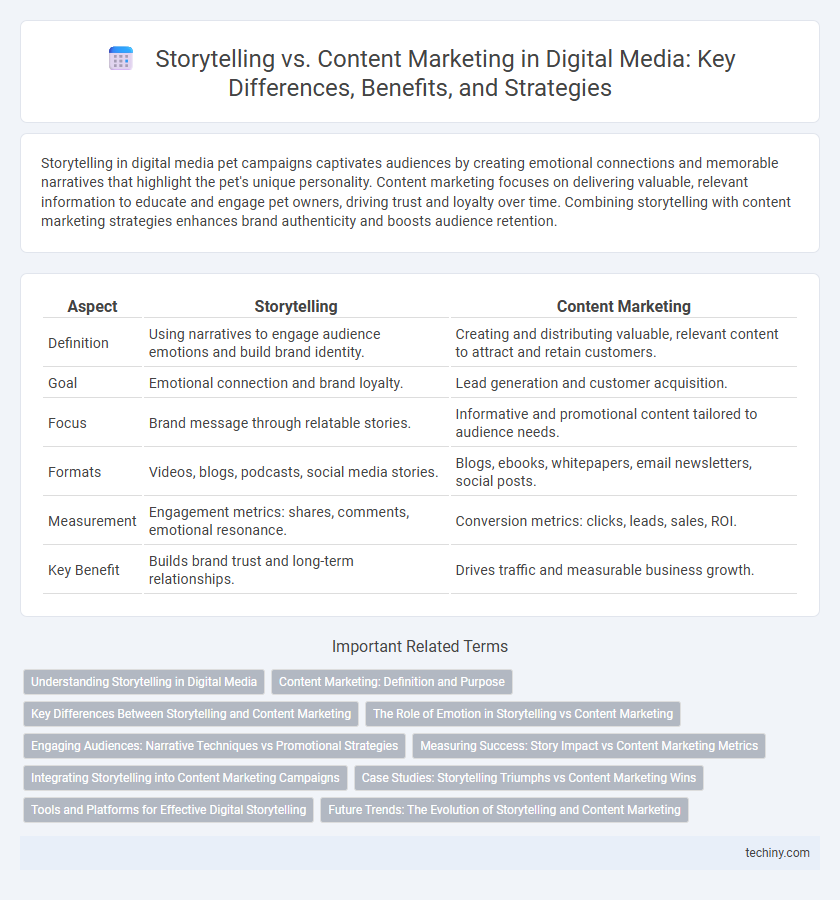Storytelling in digital media pet campaigns captivates audiences by creating emotional connections and memorable narratives that highlight the pet's unique personality. Content marketing focuses on delivering valuable, relevant information to educate and engage pet owners, driving trust and loyalty over time. Combining storytelling with content marketing strategies enhances brand authenticity and boosts audience retention.
Table of Comparison
| Aspect | Storytelling | Content Marketing |
|---|---|---|
| Definition | Using narratives to engage audience emotions and build brand identity. | Creating and distributing valuable, relevant content to attract and retain customers. |
| Goal | Emotional connection and brand loyalty. | Lead generation and customer acquisition. |
| Focus | Brand message through relatable stories. | Informative and promotional content tailored to audience needs. |
| Formats | Videos, blogs, podcasts, social media stories. | Blogs, ebooks, whitepapers, email newsletters, social posts. |
| Measurement | Engagement metrics: shares, comments, emotional resonance. | Conversion metrics: clicks, leads, sales, ROI. |
| Key Benefit | Builds brand trust and long-term relationships. | Drives traffic and measurable business growth. |
Understanding Storytelling in Digital Media
Storytelling in digital media leverages emotional engagement and narrative techniques to create immersive experiences that resonate deeply with audiences. It emphasizes authentic connections by weaving brand messages into compelling stories, enhancing memorability and fostering audience loyalty. This approach contrasts with traditional content marketing by prioritizing meaningful narratives over direct sales or promotional content.
Content Marketing: Definition and Purpose
Content marketing is a strategic approach focused on creating and distributing valuable, relevant, and consistent content to attract and retain a clearly defined audience. Its primary purpose is to drive profitable customer action by building trust and fostering brand loyalty. Effective content marketing leverages various digital media channels to deliver personalized messages that address audience needs and pain points.
Key Differences Between Storytelling and Content Marketing
Storytelling in digital media revolves around creating emotional connections through narratives that engage audiences on a personal level, whereas content marketing focuses on delivering valuable information to drive consumer actions and brand awareness. Key differences include storytelling's emphasis on narrative structure and emotional resonance, contrasted with content marketing's strategic approach targeting specific customer needs and measurable marketing goals. While storytelling often forms the foundation of content marketing, the latter integrates diverse content types like blogs, videos, and infographics aimed at lead generation and conversion optimization.
The Role of Emotion in Storytelling vs Content Marketing
Emotional engagement is crucial in storytelling, as it creates deeper connections with audiences by evoking feelings that foster trust and loyalty. Content marketing often relies on informative and persuasive elements to drive conversions but may lack the emotional depth found in storytelling. Integrating emotional storytelling into content marketing strategies enhances brand resonance and consumer retention by making messages more memorable and impactful.
Engaging Audiences: Narrative Techniques vs Promotional Strategies
Storytelling leverages emotional resonance and character-driven narratives to captivate audiences, fostering deeper connections through relatable experiences and immersive plots. Content marketing employs targeted promotional strategies, utilizing data-driven insights and calls to action to drive engagement and conversions across digital platforms. Integrating narrative techniques with strategic content marketing enhances audience retention and amplifies brand messaging effectiveness.
Measuring Success: Story Impact vs Content Marketing Metrics
Measuring success in storytelling emphasizes assessing emotional engagement, narrative resonance, and audience connection through qualitative feedback and brand sentiment analysis. Content marketing metrics prioritize quantitative data such as click-through rates, conversion rates, bounce rates, and ROI to evaluate campaign effectiveness and audience reach. Combining these approaches ensures a holistic understanding of both brand impact and marketing performance in digital media strategies.
Integrating Storytelling into Content Marketing Campaigns
Integrating storytelling into content marketing campaigns enhances audience engagement by creating emotionally resonant narratives that align with brand values and customer needs. Effective storytelling transforms standard marketing messages into compelling experiences, driving higher conversion rates and fostering stronger brand loyalty. Leveraging authentic characters, relatable scenarios, and clear messaging within content marketing ensures deeper connection and sustained attention across digital media platforms.
Case Studies: Storytelling Triumphs vs Content Marketing Wins
Case studies reveal storytelling triumphs through emotional engagement and memorable narratives that foster deep audience connections, boosting brand loyalty and recall. Content marketing wins excel in delivering targeted, data-driven information that drives conversions and measurable ROI by aligning with specific consumer needs. Combining storytelling's emotional appeal with content marketing's strategic precision often yields the most impactful digital media campaigns.
Tools and Platforms for Effective Digital Storytelling
Digital storytelling leverages immersive tools like video editing software, augmented reality (AR), and interactive web platforms to create engaging narratives that captivate audiences on social media and streaming sites. Content marketing utilizes analytics-driven platforms such as HubSpot, Google Analytics, and email marketing automation to distribute targeted messages and optimize user engagement. Both approaches benefit from integrating multimedia tools like Canva and Adobe Creative Cloud, enhancing visual appeal and ensuring seamless cross-channel storytelling.
Future Trends: The Evolution of Storytelling and Content Marketing
Future trends in digital media highlight a convergence between storytelling and content marketing, where immersive experiences powered by augmented reality (AR) and artificial intelligence (AI) will dominate audience engagement strategies. Data-driven personalization and interactive narratives are set to redefine how brands connect with consumers, making content more relevant and emotionally impactful. Emerging technologies like deep learning algorithms will enable hyper-targeted storytelling, creating seamless integrations between brand messages and authentic user experiences.
Storytelling vs Content Marketing Infographic

 techiny.com
techiny.com